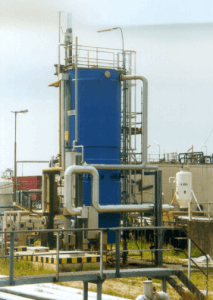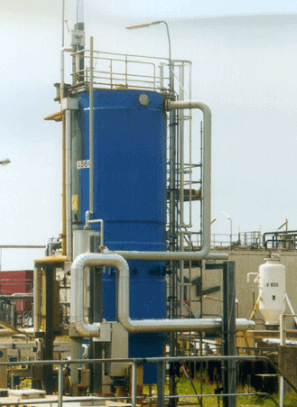Efficient method for removal of aromatic carbons
At soil remediation and drainages ground water may be contaminated with mono- and polycyclic hydrocarbons. These components are often present in concentrations which do not allow further processing unless the water is treated. An appropriate solution is required to handle this.
Familiar treatment methods apply the use of activated carbon. This generates a downside: after saturation the carbon is to be regenerated or to be wasted.
Biological degradation in a continuous moving bed media filter is successfully applied to convert both mono-cyclic and poly-cyclic hydrocarbons into harmless components. The oxygen required for the biomass to grow is introduced either by pure oxygen or air into the filter bed. Biomass is growing on top of the sand grains. The continuous washing process is controlled to allow the active biomass to remain within the system. Hence the equivalent sludge retention time (SRT) is well above 10 days.
Practical results have been obtained with feed mono-cyclic hydrocarbon concentrations in the range of 500 – 1,000 µg/l and poly-cyclic hydrocarbon concentrations in the range of 40 – 80 µg/l. Filtrate concentrations are recorded, typically less than 5 µg/l. These results are achieved at hydraulic retention times of only 10 – 20 minutes.
The process does not generate any chemical waste. The continuous wash water flow contains the excess biomass and the solids retained in the filter. This may be treated in the normal way.
This solution allows our clients to either discharge the effluent into surface water, meeting consent levels or to use the water as part of a water reuse scheme.
If you are interested in this subject, please contact us for further information.


